In this article:
Introduction
Acne has emerged as the most prevalent dermatological concern worldwide. It affects people of all ages, gender, and ethnicities but some more than others. Acne occurs most commonly in adolescents and young adults but is certainly not limited to these populations. Estimates of its prevalence in adolescents range from 35% to over 90%.
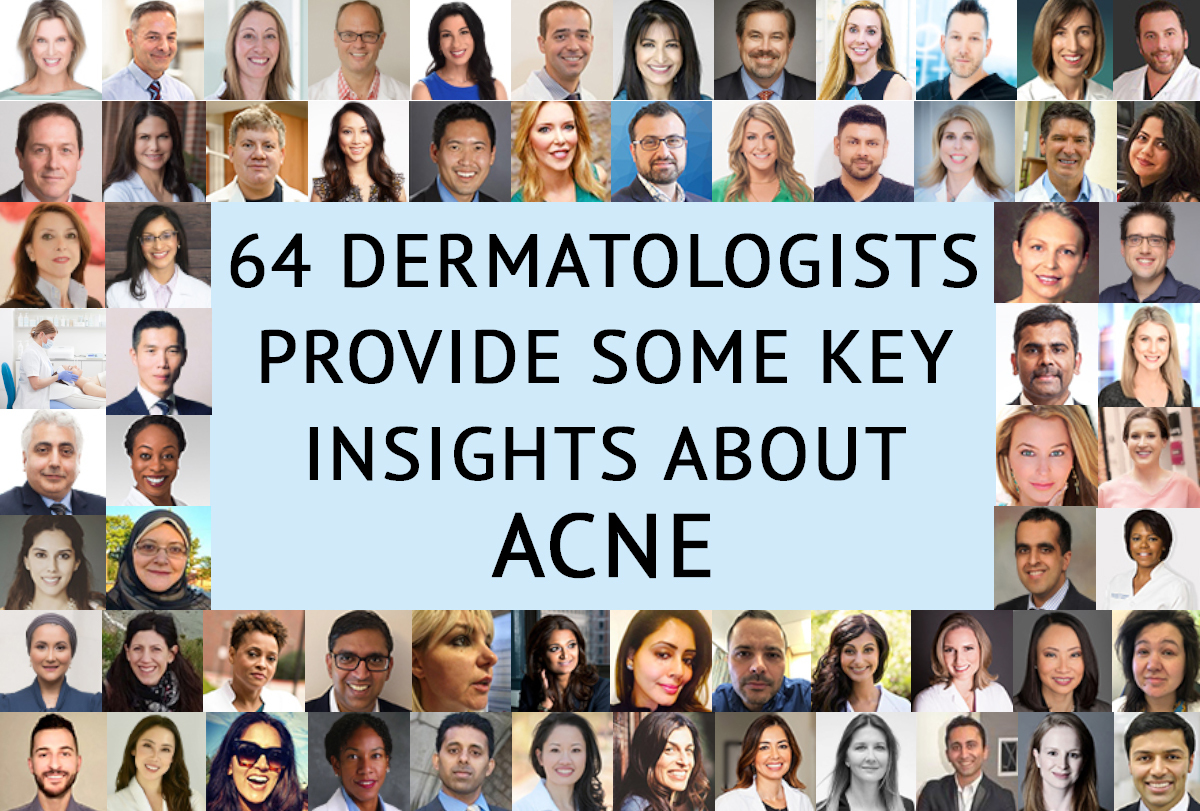
Even though acne is commonly associated with adolescence, the condition can persist well into adulthood. In fact, some people experience their first breakout when they are way past their teenage years. This late-onset acne, also known as adult acne, is generally more stubborn than teenage breakouts, and it affects women more than men, particularly during menopause.
Generally speaking, adolescent acne typically exhibits a male predominance, whereas postadolescent acne predominantly affects women. This skin condition does not have a set course or etiology and can manifest differently in different patients.
Some people are constantly riddled with acne, whereas others get infrequent flare-ups. Similarly, some people may develop clearly visible pimples all over the face and perhaps even the back, whereas others only get a few small pimples here and there.
Given that acne is a wide-ranging ailment with multiple triggers and types, deciding the best course of treatment can be quite tricky. Increased sebum production by the sebaceous glands plays a major role in the genesis of acne vulgaris.
The additional factors that play a role are follicular hyperkeratinization (abnormal skin shedding), the excessive presence of Cutibacterium acnes (an anaerobic diphtheroid that is a normal component of the skin flora), and inflammation.
Here’s a survey that touches upon some of the most pressing concerns regarding acne. It helps you understand the basic dos and don’ts for effectively treating this condition.
A total of 64 skin specialists answered a carefully designed questionnaire, which became the basis of certain key findings elaborated in the survey.
For instance, the majority of the surveyed dermatologists found oily skin to be most prone to acne in their years of experience.
Methodology
This online survey was conducted by eMediHealth, which is a web-based platform for evidence-based and expert-reviewed health information.
It included 64 dermatologists, the majority of whom are from the United States, followed by the United Kingdom, Canada, and Australia in that order.
The participants received a questionnaire that included some of the most frequently asked queries regarding acne. The list included seven multiple-choice questions seeking their expert opinion about various aspects of acne.
- What are its common triggers?
- Does it cause permanent scarring?
- What are the common mistakes that can aggravate the condition?
- Which skin type is more prone to acne?
- Are there any lifestyle changes that can help reduce acne breakouts?
- Which medical treatment works best for acne?
- Are home remedies effective in treating acne?
The participants were expected to select any number of options from the list of answers. Their individual responses were compiled to come up with key statistical findings.
The survey was conducted and analyzed over a period of 2 months, from October to November 2019.
Additionally, the participants were asked to register their personal recommendations for the treatment of acne, which are listed at the end of this article.
Limitations
The results of this survey are subject to the following assumptions and biases:
- The survey has a limited coverage as it includes the answers of only a small fraction of dermatologists, 64 to be specific.
- It is impossible to include all the relevant response options in certain broad-based questions.
- The answers given by the dermatologists are primarily based on their personal knowledge and experience.
- The survey sample is restricted to dermatologists from four countries, whose inherent cultural biases may have inadvertently influenced the final outcome.
- An online survey is subject to certain constraints, due to which we cannot guarantee 100% accuracy of the answers.
- The results of this survey cannot be generalized to cover all demographics.
Results
According to experts, hormonal imbalance is the leading trigger for acne breakouts.
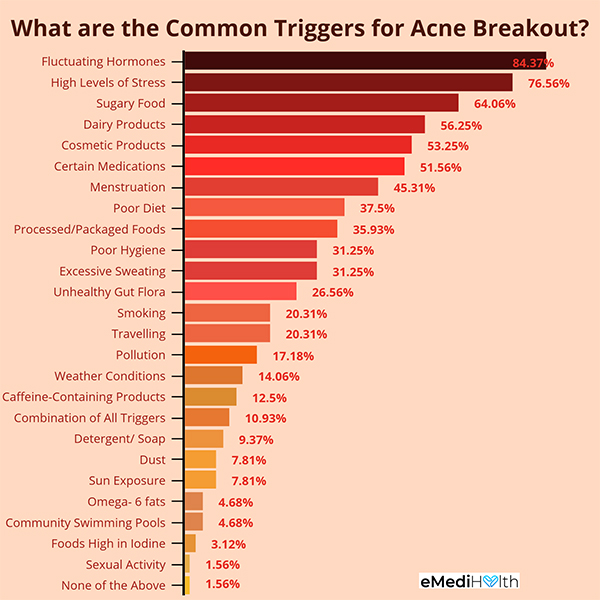
The participants were given a list of potential acne triggers and asked to select the ones they thought are most prevalent.
Of all the 26 options, fluctuating hormones got the highest number of votes, which makes it the most commonly reported trigger for acne flare-ups.
Out of the 64 dermatologists, 51 (84.37%) chose hormonal fluctuations, closely followed by increased stress (registered 76.56% affirmation) and then factors such as sugary foods (64.06%), dairy intake (56.25%), and the use of cosmetic products (53.25%). Together, these were found to be the top five triggers of acne.
On the other hand, certain factors that are generally considered conducive to acne figured surprisingly low on the list, such as smoking (20.31%), pollution (17.18%), and dust (7.81%).
Sun exposure, consumption of omega-6 fats or iodine, visiting community swimming pools, and sexual activity were cited as the least important triggers of acne.
Clinical observations also support the importance of androgens (male hormones) for the development of acne. Androgens contribute to the development of acne by stimulating the growth and secretory function of the sebaceous glands.
Androgen excess due to conditions such as polycystic ovarian syndrome, congenital adrenal hyperplasia, and adrenal or ovarian tumors can also cause acne.
Depending on its type, acne may or may not cause permanent scars.
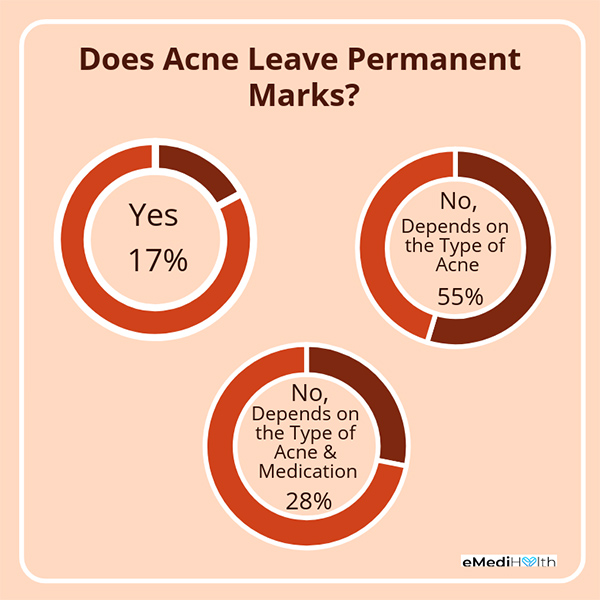
Acne is generally associated with skin scarring, but the survey revealed that this risk does not apply equally to all forms of acne.
When asked if acne always leaves behind permanent marks, 55% of the dermatologists answered in the negative. They specified that the likelihood of scarring depends primarily on the type of acne.
Of the 64 respondents, 18 stated that scarring depends on both the type of acne and the acne medication used, while the remaining 11 participants agreed that acne does leave behind permanent marks.
Inflammatory acne is considered more likely to result in scarring than non-inflammatory acne. Various types of scars may result from acne, including atrophic scars (ice pick scars, rolling scars, and boxcar scars), hypertrophic scars, and keloids.
Excessive skin cleaning and self-treating acne without any professional consultation are two of the most common mistakes that can increase the severity and frequency of breakouts.
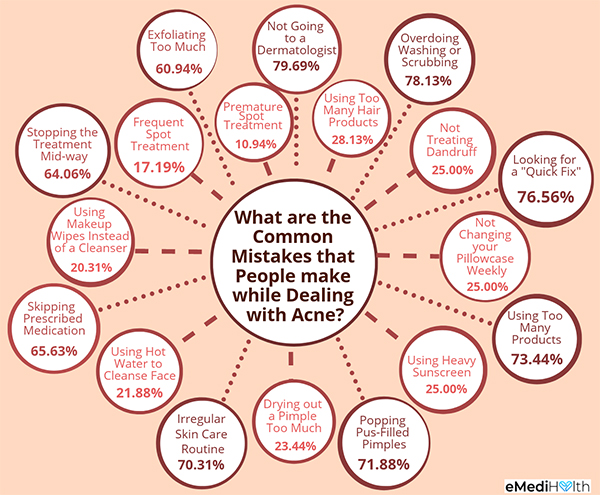
People with acne often make some easily avoidable mistakes that can aggravate their skin condition.
To gain a clearer understanding of the basic dos and don’ts of acne treatment, the skin specialists were asked to identify the most common errors that should be avoided to improve the condition of acne-ridden skin.
Eighteen mistakes that are usually made by individuals affected by acne were shortlisted, and the experts were asked to pick the most predominant ones.
Fifty-one (79.69%) out of the 64 dermatologists reported that a lot of people do not seek professional dermatological help for acne, either in a timely manner or at all, which can further deteriorate their condition.
Excessive scrubbing and washing of the acne-ridden skin is another counterproductive habit that was frequently observed by the dermatologists, with 78.13% of the total respondents picking this option.
Another major mistake that can undermine acne treatment or lead to further breakouts is seeking immediate results with treatments that may not be suitable for the individual’s skin type or condition.
Forty-nine of the total participants recognized this as a contributing factor for acne.
A considerable number of the dermatologists also felt that the overuse of skin products, pimple-popping, and an irregular skin care routine can worsen acne.
Most acne patients tend to have oily skin.
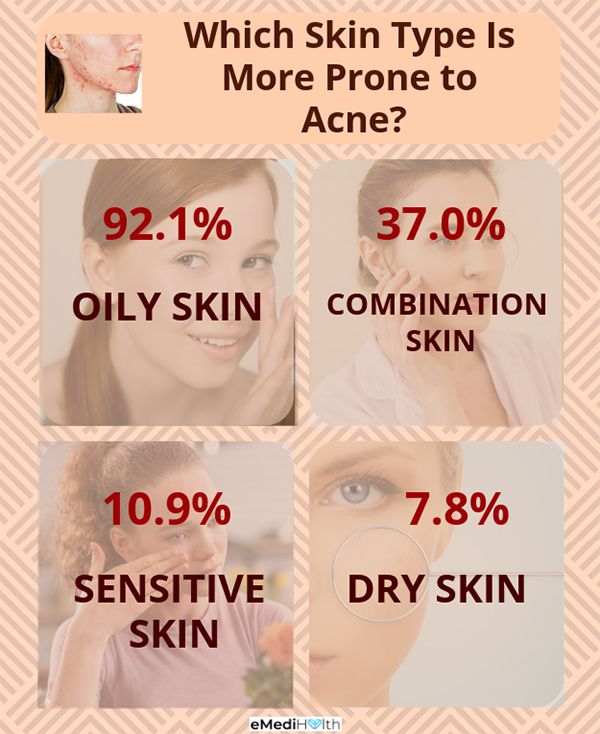
The incidence of acne significantly depends upon the skin type. This means that some skin types are more susceptible to this condition than others.
The survey panelists were asked to specify which skin types are more likely to develop acne and their answers pointed to an almost unanimous verdict.
A whopping 92.1% of the total participants cited oily skin to be most prone to acne, with combination skin coming a distant second.
On the other hand, people with sensitive or dry skin are less likely to develop acne, as evidenced by the fact that less than 10 dermatologists chose these options.
People with oily skin tend to have overactive oil glands that produce excessive sebum, which in turn plays a major role in the genesis of acne vulgaris.
Do not go to sleep with makeup on and diligently follow your skin care routine if you want acne-free skin.
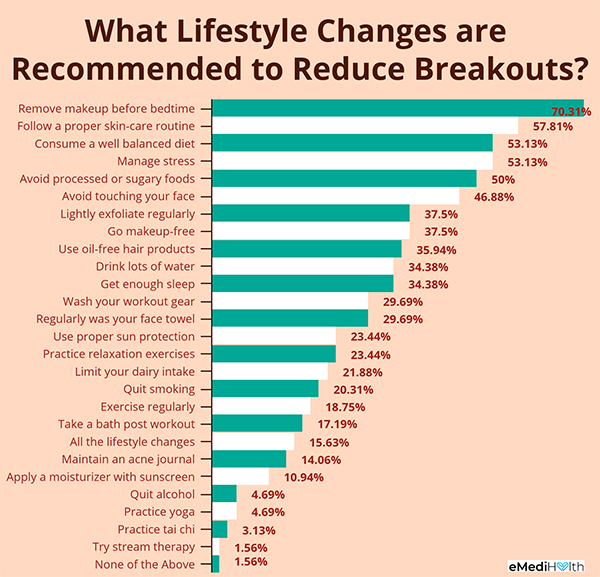
In addition to the dermatologist-recommended treatment, several lifestyle changes can help reduce the severity and frequency of acne breakouts. The changes may apply to your skin care routine, diet, exercise regimen, and general well-being.
The panelists were asked to select the most helpful self-care practices from a list of 27 options.
Out of the 64 dermatologists, 45 stressed on the importance of removing makeup before going to sleep to keep acne under control. Maintaining a regular skin care regimen was the second most popular option on the list, followed by healthy eating and proper stress management.
Half of the dermatologists also advised cutting down sugar intake as a means to prevent acne.
Not many dermatologists felt that alternative interventions such as yoga, tai chi, and steaming are likely to yield any drastic improvement, and one of the respondents did not see the use of any of the listed self-care measures for acne reduction.
On the contrary, 10 of the dermatologists felt that each and every option on the list may serve some purpose in improving this skin condition.
Isotretinoin and retinoids have the highest success rate for acne treatment.
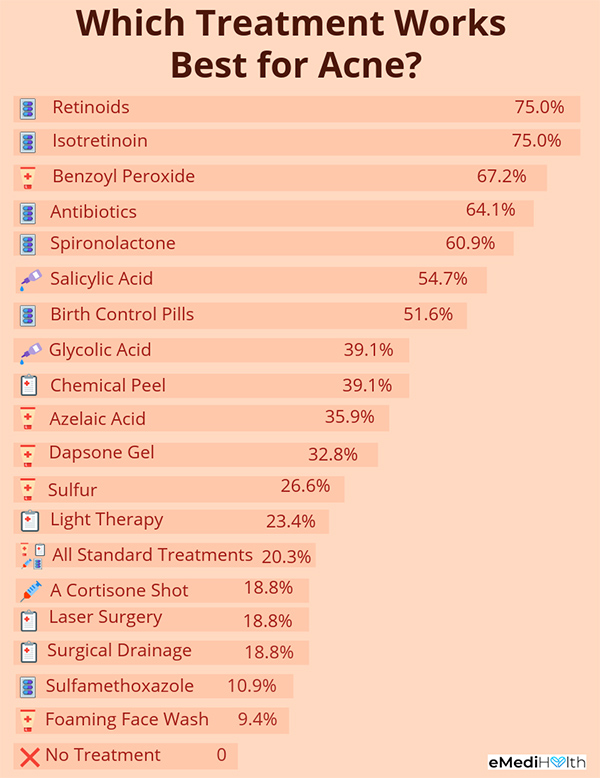
There are numerous treatment options for acne, which range from topical and oral medications to clinical procedures.
A list of commonly used acne treatments was shared with the survey participants, and they were asked to pick the ones with a high success rate.
Isotretinoin was recommended by 75% of the dermatologists, and an equal percentage favored the use of retinoids. Benzoyl peroxide, antibiotics, and a drug by the name of spironolactone occupied the lower three slots in the list of top five effective treatments for acne, registering 67.2%, 64.1%, and 60.9% of the votes, respectively.
There is also a shift in dermatologists’ approach to acne treatment. they now focus on targeting the inflammation.
In addition, many dermatologists use combination therapy to treat their patients. For instance, they combine some of the ingredients listed in the graph, such as retinoids and benzoyl peroxide or clindamycin and benzoyl peroxide at different concentrations.
Chemical peel is a minimally invasive cosmetic intervention that also got picked by a sizeable number of dermatologists, 39.1% to be exact.
The clinical type and severity of acne (e.g., comedonal, papulopustular, mixed, nodular) determine the types of treatments needed. The skin type (e.g., dry, oily) influences the choice of topical drug vehicles.
The presence of acne scarring tells the clinician to consider a more aggressive acne therapy and treatments for scarring.
The presence of post-inflammatory hyperpigmentation indicates the need to consider therapies for hyperpigmentation as well as the need to resolve and prevent inflammatory acne lesions.
The patient’s menstrual cycle and history of signs of hyperandrogenism in women identify the need to consider further laboratory workup and hormonal therapies.
The psychological impact of acne on the individual points to the need for a more aggressive treatment approach or psychologic services.
Home remedies such as witch hazel, essential oils, and aloe vera may be used for acne, but they do not guarantee positive results.
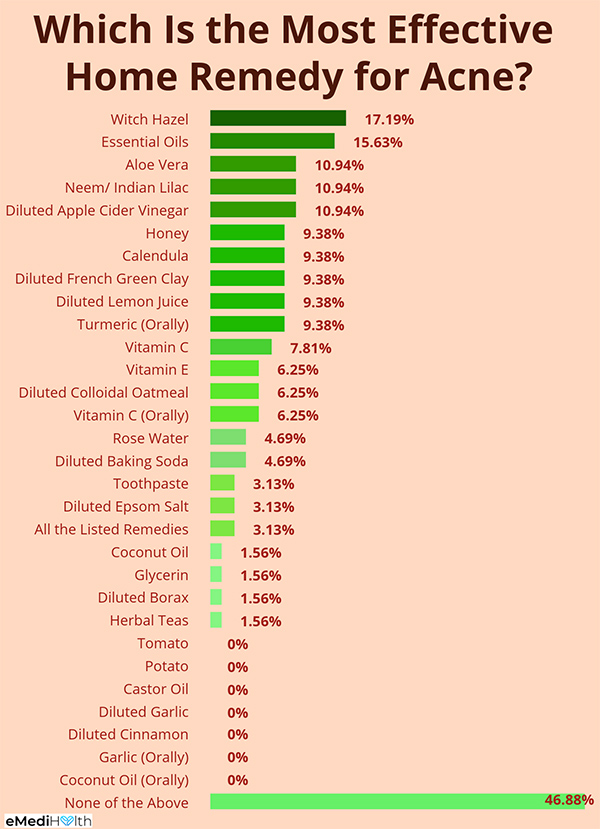
Patients with acne often resort to various home remedies that may or may not be effective. Moreover, not all remedies suit every skin type, and some may even be damaging in general.
A list of commonly used acne remedies was prepared and the survey participants were asked to pick the ones that may be beneficial. Although 30 of the 64 dermatologists found home remedies to be largely ineffective for acne treatment, a number of them approved some of the options.
In terms of effectiveness, witch hazel was the most picked option, followed by essential oils, aloe vera, neem/Indian lilac, diluted apple cider vinegar, and honey.
However, the results revealed a general consensus among the medical community that home remedies do not work as a standalone or primary treatment for acne.
Highlights and Key Statistical Findings

- Sixty-four dermatologists from four different countries participated in the survey, 37 of whom are from the United States, 16 from the United Kingdom, 6 from Australia, and the remaining 5 from Canada.
- Hormonal imbalance plays a major role in the development of acne and was identified as the top trigger for acne by 84.37% of the surveyed dermatologists. High levels of stress came in a close second, with 76.56% of the votes, followed by excessive sugar intake, which was selected by 64.06% of the total participants.
- You can rest easy knowing that not all forms of acne are likely to cause permanent scarring. More than half (55%) of the participants held the view that the risk of scarring largely depends on the type of acne, and 28% believed that it depends on both the type of acne and the medication used to treat it.
- Of the respondents, 79.69% felt that patients with acne usually make the error of not seeking dermatological help, which can worsen their condition. A substantial number of dermatologists also cited excessive skin cleaning (78.13%) and looking for quick solutions through unverified treatments or remedies (76.56%) as common mistakes made by patients with acne.
- When asked which skin type is most prone to acne, an overwhelming majority (92.1%) of the dermatologists voted for oily skin, whereas dry skin (7.8%) was found to be the least affected.
- You must make it a habit to remove every trace of makeup before going to bed so your skin can breathe easy while you sleep. This bedtime skin ritual got the highest number of votes as the most favorable lifestyle change for acne relief and was recommended by 70.31% of the respondents.
- Among the standard acne treatments, isotretinoin and retinoids emerged as clear favorites, each registering 75% of the votes.
- If the responses of the panelists were to be considered, the overall effectiveness of home remedies for acne is decidedly low. A total of 46.88% of the dermatologists stated that none of the remedies are likely to yield any significant results, and only 3.13% felt that the listed acne remedies may be helpful in some way. Witch hazel topped the list with 17.9% of the votes, followed by essential oils, which were recommended by 15.63% of the respondents.
What do the Dermatologists suggest?

Adean Kingston, MD – USA
Dr. Kingston is a board-certified dermatologist practicing in Dallas, Texas. She specializes in general medical, cosmetic, and surgical dermatology.
Website

Aleksandar Godic, MD, Ph.D. – UK
Dr. Godic is a Consultant Dermatologist, European Board-Certified Dermatopathologist practicing in London, UK. He has special interests in general hair and aesthetic dermatology, primarily in stem cell treatment.
Instagram LinkedIn

Amy Perlmutter, MD – USA
Dr. Perlmutter is a board-certified dermatologist practicing at the New York Dermatology Group, NYC.
Website

Anne Truitt, MD – USA
Dr. Truitt is a board-certified dermatologist and Mohs surgeon, practicing in San Diego, California, at Skin Surgery Medical Group.
Website
Expert Advice:
- Find a regime and stick to it! Don’t expect a quick fix. You will need to continue your plan for 4-6 weeks to evaluate for improvement.
- Don’t use too many products all at once. They may not be needed, and may also “over-stress” the skin.
- Limit the number of washes per day to two (or also after workouts), and not always with an “acne” wash. You can add a gentle cleanser to one of your washes if your skin is too dry.
- Do not pick or aggravate a pimple-this can cause permanent scarring.
- Enlist the help of a dermatologist early on if the initial regimen is not effective. Acne can cause permanent scarring if not treated properly and in a timely fashion.

Asif Hussein, MBBS – UK
Dr. Hussein is a Cosmetic Dermatologist & Cutaneous Laser Surgeon. He is UK’s leading specialist in Fully Ablative Laser Surgery and surgical management for acne scarring.
Instagram Website
If acne persists or increases in severity, then seeking specialist advice is the best way forward. As one of the UK’s leading specialists in acne scar management, I believe it is important to manage acne early, and my threshold for aggressive intervention is relatively low. The rationale for this is that if acne is not managed early and adequately, it will leave people with permanent scarring, which is very difficult and costly to treat and from a cosmetic perspective, will reduce confidence and self-esteem. Therefore, scarring is best avoided by having early effective acne treatment.

Barry Goldman, MD – USA
Dr. Goldman is a Fellow of the American Academy of Dermatology and has been in private practice since 1995. Currently, he is a clinical instructor at Cornell NY Presbyterian Hospital.
Instagram Facebook Website
Expert Advice: A proper evaluation of your type of acne by a dermatologist is a must. Determine the type of acne and location. Comedonal acne needs more topical retinoids. Inflammatory acne needs benzoyl peroxide and/or antibiotics. A dermatologist can also look into contributing factors like workout gear and diet. Avoid overwashing and scrubbing. The acne is under your skin. Your body will just produce more oil and sebum to compensate. If you notice any scarring, it is time to see the dermatologist.

Chris Jalilian, MBBS – Australia
Dr. Jalilian is a Fellow of the Australasian College of Dermatologists. He is the Director of Melbourne Skin & Dermatology, a consultant dermatologist at Monash Health and a board member of the Skin Health Institute.
Website

Christina Feser, DO – USA
Dr. Feser is a board-certified Dermatologist based in Nashville, Tennessee.
Facebook

Daniel Sugai, MD – USA
Dr. Sugai is a board-certified dermatologist practicing in Bellevue and Renton, WA. He completed his studies at Harvard Medical School with interest in general/complex medical dermatology as well as aesthetics and skin surgery.
Facebook

David Orchard – Australia
Dr. Orchard is the Director of Dermatology, Royal Children’s Hospital.
LinkedIn

David Altamura – UK
His area of interest includes early diagnosis and treatment of skin cancer, skin surgery, mole mapping, pediatric dermatology psoriasis, eczema, acne, and hidradenitis suppurativa.

Devika Icecreamwala, MD – USA
Dr. Icecreamwala is a board-certified dermatologist who completed her dermatology residency and fellowship at the Henry Ford Health System in Detroit, Michigan. She has published several articles and collaborated on numerous books within her field.
Instagram Website

Dina Keen, MBBS – UK
Dr. Keen is currently practicing in Nottingham, Nottinghamshire, United Kingdom. She is skilled in acne treatment, laser rejuvenation, body contouring, rosacea treatment, and intense pulsed light (IPL) treatments.
LinkedIn

Anamica Prasad, MBChB – UK
Dr. Prasad is a dermatology expert in acne and pigmentation, based in the UK.
Instagram Facebook Website

Anita Hegde, MBChB – Australia
Dr. Hegde is an award-winning cosmetic physician with 23+ years’ experience in aesthetic medicine and a Fellow of Cosmetic Physicians College of Australasia. She is the founder of a Skincare company producing a nightly moisturizer with a natural formulation. She runs a private practice in Cremorne, Sydney, Australia.

Burcu Kim, MBBS – Australia
Dr. Kim is a Sydney-based dermatologist. Her areas of interest include acne and rosacea, scar management, cosmetics, skin cancer management, autoimmune skin disease, and pediatric dermatology.

Dina D. Strachan, MD – USA
Dr. Strachan is an internationally recognized board-certified dermatologist in New York City.
Instagram Website

Hina Shaikh Lal, MBBS – UK
Dr. Shaikh is a Certified Laser Operator for Aesthetics and is pursuing a Fellowship in Aesthetic Medicine from the American Academy of Anti-aging Medicine. She has published papers in accredited journals and has also been a guest speaker at various conferences and workshops.

Jessica Weiser, MD – USA
Dr. Weiser is the founder and Medical Director of Weiser Skin MD in Soho, NYC. She has numerous publications in peer-reviewed dermatology, surgery, and medical journals.
Instagram Website

Olga Demidova, DO – USA
Dr. Demidova is a Board Certified Dermatologist and a Fellow of the American Academy of Dermatology. After completing her medical training at Ohio University, College of Osteopathic Medicine, she proceeded to Dermatology residency training at Tri-County Dermatology, where she served as a Chief Resident during the final year of her training.

Saraswatirani Pawar, MBBS – Canada
Dr. Pawar is a dermatologist practicing in Canada. She did her MD in Dermatology, Leprosy, and Venereology from Dr. PDMM College & Research Center, India.

Edidiong Kaminska, MD – USA
Dr. Kaminska is a board-certified physician practicing integrative dermatology centered on medical, surgical, and cosmetic treatments in the US.
Website

Elizabeth K. Hale, MD – USA
Dr. Hale is a clinical Associate Professor of Dermatology at the New York University Langone Medical Center and specializes in Mohs micrographic surgery, cosmetic dermatology, and laser surgery. She is the recipient of the American Medical Women’s Association Citation and the Marion Sulzberger Dermatology Award at NYU.
Instagram Website

Faheem Latheef, MBChB – UK
Dr. Latheef is a cutaneous allergy specialist with a special interest in acne, overseeing the largest number of acne patients in the region. He practices at Europe’s largest teaching hospital in Leeds.
Instagram Facebook Twitter Website

Faisal Ali, BMBCh – UK
Dr. Ali is a consultant dermatologist, Mohs micrographic, and laser surgeon working in Manchester and London, UK. He has expertise in skin cancer, pigmentary disorders, and treatment of acne and acne scarring.
Website

Firas Al-Niaimi, MRCP – UK
Dr. Al-Niaimi is a consultant dermatologist in the UK, with over 160 scientific publications.

Gilberto Alvarez, MD – USA
Dr. Alvarez is a member of the prestigious Alpha Omega Alpha Honor Medical Society and holds faculty appointments at both NYU and Mount Sinai Hospitals. He has done extensive research into psoriasis and metabolic syndrome, rosacea, and cutaneous t-cell lymphomas.
Instagram Facebook Website

Giulia Ruina – UK
Dr. Ruina is a dermatologist and venereologist, trained in Italy but currently working in the UK.

Heather D. Rogers, MD – USA
Dr. Rogers practices at Modern Dermatology and is the creator of Doctor Rogers RESTORE. She lectures nationally, is well published, and an active member of the American Academy of Dermatology Media Expert Team.
Instagram Website

Jason Emer, MD FAAD – USA
Dr. Jason Emer of Emerage Medical is globally recognized as one of the most cutting-edge dermatologists and cosmetic surgeons. He specializes in cosmetic, laser, procedural dermatology, surgical and nonsurgical facial sculpting, and body contouring.
Instagram Website YouTube

Jeffrey S. Fromowitz, MD – USA
Dr. Fromowitz is an internationally recognized expert in dermatology and dermatologic surgery. He frequently lectures on acne and rosacea and runs a private practice in Boca Raton, Florida.
Instagram Website

Jeffrey T.S. Hsu, MD – USA
Dr. Hsu is a Clinical Assistant Professor at the University of Illinois-Chicago and a member of the American Academy of Dermatology, American Society for Dermatologic Surgery, the American Society for Laser Medicine and Surgery. He is an internationally recognized expert in dermatologic and cosmetic surgery, frequently invited to teach other physicians.
Instagram Website

Jeffrey Weinberg, MD – USA
Dr. Weinberg is a part of Mount Sinai Beth Israel/SLR Dermatology Associates. His areas of special interest include dermatological surgery, eczema, psoriasis, and infectious diseases of the skin.
Website

Jennifer Lee, MD – USA
Dr. Lee is the Founding Director of REN Dermatology & Laser Center in Nashville, Tennessee. She specializes in medical and cosmetic dermatology.
Instagram Website

Keira Barr, MD – USA
Dr. Barr is a best-selling author, international speaker, and dual board-certified dermatologist. Dr. Barr’s expertise has been featured on national television, radio, podcasts as well as MindBodyGreen, Reader’s Digest, Glamour, SELF, and Well+Good.
Website

Kristen Richards, MD – USA
Dr. Richards is a fellowship-trained Mohs Surgeon and board-certified dermatologist. She is the founder of Torrey Pines Dermatology in San Diego, California.
Website

Leona Yip – Australia
Experienced medical, surgical, and laser dermatologist and an alopecia (hair loss) expert from Australia.
Instagram

Mamina Turegano, MD – USA
Dr. Mamina Turegano is a triple board-certified dermatologist, internist, and dermatopathologist. In addition to practicing dermatology, she is serving as the dermatopathologist for Old Metairie Dermatology and a volunteer instructor at Tulane University in the department of dermatology.
Instagram Website

Marguerite J. Critelli, MD – USA
Dr. Critelli is a board-certified Dermatologist, board-certified in integrative medicine, and the founder of Crystal Cove Dermatology, Newport Beach, CA.

MaryBeth Parisi, MD – USA
Dr. Parisi is a Harvard trained board-certified dermatologist. She is skilled in adult and pediatric dermatology, surgical and cosmetic dermatology, and skin cancer treatment.
Facebook

Michael Steppie, MD – USA
Dr. Steppie is a board-certified dermatologist and Mohs micrographic surgeon, president and medical director of Associates in Dermatology celebrating its 30th anniversary. He is celebrating his 10th year as an elite member of the Skin Cancer Foundation’s Amonette Circle. Michael Steppie MD has been honored with multiple Distinguished Physician Recognition Awards from the AMA and also received Patient’s Choice 5th Anniversary Award, granted only to doctors whose ratings have reflected excellence in care for five years in a row.
Facebook Twitter Website

Natalia Spierings, MBBS – UK
Dr. Spierings is a consultant Dermatologist & Mohs Micrographic Surgeon working in both London and Dubai. She is also the medical director at Dermatica.co.uk, a dermatology-specific compounding pharmacy, and online dermatology service.
Instagram Website

Navid Ezra, MD – USA
Dr. Ezra is a board-certified dermatologist in Thousand Oaks, CA. He provides quality medical, surgical, and cosmetic dermatologic care in Los Angeles and Ventura County.
Instagram

Niyati Sharma, MBBS – Australia
Dr. Sharma is a plant-based dermatologist from Australia. She completed her MBBS from the University of Adelaide, Australia, in 2007.

Paul Cellura, MD – USA
A New York dermatologist at Tribeca Skin Center in Manhattan.
Instagram

Penelope Tympanidis, MD – UK
Dr. Tympanidis is a UK trained Consultant Dermatologist and an expert on acne and acne scarring treatments for over 20 years. She offers a full range of cosmetic dermatology treatments, including thread lift, face sculpting, and scar remodeling.
Website

R. Sonia Batra, MD – USA
Dr. Batra is a board-certified dermatologist and the founder of a dermatology practice in Santa Monica, CA, and a Co-Host of The Doctors television show.
Instagram Twitter Website

Rachel Netahe Asiniwasis, MD – Canada
Dr. Asiniwasis is a double-board certified dermatologist practicing in Regina, Saskatchewan. She completed her residency at the University of Toronto and is one of the first full-time dermatologist working in Southern Saskatchewan.
Website

Raechele Gathers, MD – USA
Dr. Gathers is a board-certified dermatologist, Skin of Color expert, and the founder of the website MDhairmixtress.com, a platform that promotes health, wellness, and beauty for black women.
Website

Raja Sivamani, MD – USA
Dr. Sivamani is an integrative dermatologist with training as a board-certified dermatologist and an Ayurvedic practitioner. He engages in integrative research and clinical care.
Website

Renita Ahluwalia, MD – Canada
Dr. Ahluwalia is a Canadian and American board-certified dermatologist. She is the lead dermatologist at the Canadian Dermatology Centre and is a lecturer at the University of Toronto and cross-appointed at Women’s College Hospital and the University Health Network.

Robert Grant, MD – USA
Dr. Grant is a Plastic Surgeon-in-Chief at New York-Presbyterian Hospital, the University Hospital of Columbia and Weill Cornell in New York City. He is a member of the American Association of Plastic Surgeons (AAPS), the American Society of Aesthetic Plastic Surgery (ASAPS) and the American Society of Plastic Surgeons (ASPS).
Website

Sabrina G. Fabi, MD – USA
Dr. Fabi has authored over 120 medical articles, co-authored 20 book chapters, and has lectured nationally and internationally in over 30 countries. She is a regular medical correspondent on Fox5 News San Diego and Co-Host of the GIST.

Safaa Elbanna, MD – Canada
Dr. Elbanna is a Dermatologist and Laser specialist from Egypt, practicing in Canada. She is a member of the American Board of Aesthetic Medicine, Diploma of Holistic Nutrition (Canada), Diploma of Homeopathy (Canada), Diploma of Herbal Medicine (Canada).
Website
Expert Advice: Acne is a multifactorial condition with different types and degrees, and dealing with it differs accordingly. Here are some recommendations:
- Manage any causative factor, if any (hormonal, medication, etc.).
- Manage the acne itself with a proper cleanser, topical keratolytic, systemic antibiotics or other needed medications, and spot treatment.
- Focus on sun protection and skin hydration.
- Stick with the treatment regimen for the proper time, which can extend up to 6 months to one year before we start maintenance.
- Get good sleep, manage stress, take a low glycemic diet, and include omega-3 fatty acids.
- Avoid makeup at the time of flare-ups.
- Remember that acne is not a hygiene problem, so don’t over wash or scrub.
- Avoid poking the pimples to avoid scaring.

Sandy Skotnicki, MD – Canada
Dr. Skotnicki is the founding director of the Bay Dermatology Centre and is the Assistant Professor at the University of Toronto, Department of Medicine in the Divisions of Dermatology and Occupational and Environmental Health.
Website

Sapna Westley MD – USA
Dr. Westley is a board-certified dermatologist and specializes in medical dermatology and dermatologic surgery, including state-of-the-art cosmetic surgical procedures. She is an attending physician at New York Downtown Hospital and has a private practice in Manhattan.
Website

Senthil Muraki Nachappan, MD – UK
Dr. Murali is a Consultant Dermatologist at the Royal Free Hospital in London. He has wide experience in treating all skin types and is a general dermatologist with a special interest in pediatric dermatology, male genital skin diseases, minor surgical procedures, and botox treatment for hyperhidrosis.

Shaaira Nasir, MBBCh – UK
Dr. Nasir is a consultant dermatologist at Skin55 in Harley Street and BMI The London Independent Hospital, London.
Instagram

Sherry Shieh, MD – USA
Dr. Shieh practices dermatology in New York City in academics and private practice. She sees medical and cosmetic patients and her areas of expertise include skin of color, phototherapy, photodynamic therapy, skin cancer, laser, and functional medicine.

Sonia Badreshia Bansal, MD – USA
Dr. Bansal is the co-founder of the center Elite MD in the Greater East Bay San Francisco Area. She is the co-editor of the medical textbook “Treatments for Skin of Color” and appears on KRON Channel 4 Morning News Segments, “Healthy Skin with Dr. Sonia.” She serves as a media consultant, quoted in various women’s magazines from Dr. Oz to Oprah Magazine.
Instagram Facebook Twitter

Thomas King, MBChB – UK
Dr. King is a specialist trainee (ST6) in Sheffield, UK. His clinical interests include medical dermatology, inflammatory skin disease, and biologics.

Vikram Rajkomar, MBBS – UK
Dr. Rajkomar works at NHS and is split between Salford Royal NHS Foundation Trust and Vernova Dermatology, based in Macclesfield. He is currently a Clinical Audit lead at Salford Royal, ensuring that clinical practice meets and exceeds the desired standard.
Website

Vindhya Veerula, MD – USA
Dr. Veerula is an Integrative Dermatologist practicing in Fort Wayne, Indiana.
Instagram Website

Yolanda Holmes, MD – USA
Dr. Homes studies dermatology from the Medical College of Pennsylvania. She works closely with the health and beauty industry, other health care providers and resources in various fields in the development of new medications, devices and skin, and hair care products.
Website
- Was this article helpful?
- YES, THANKS!NOT REALLY



